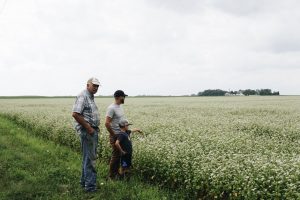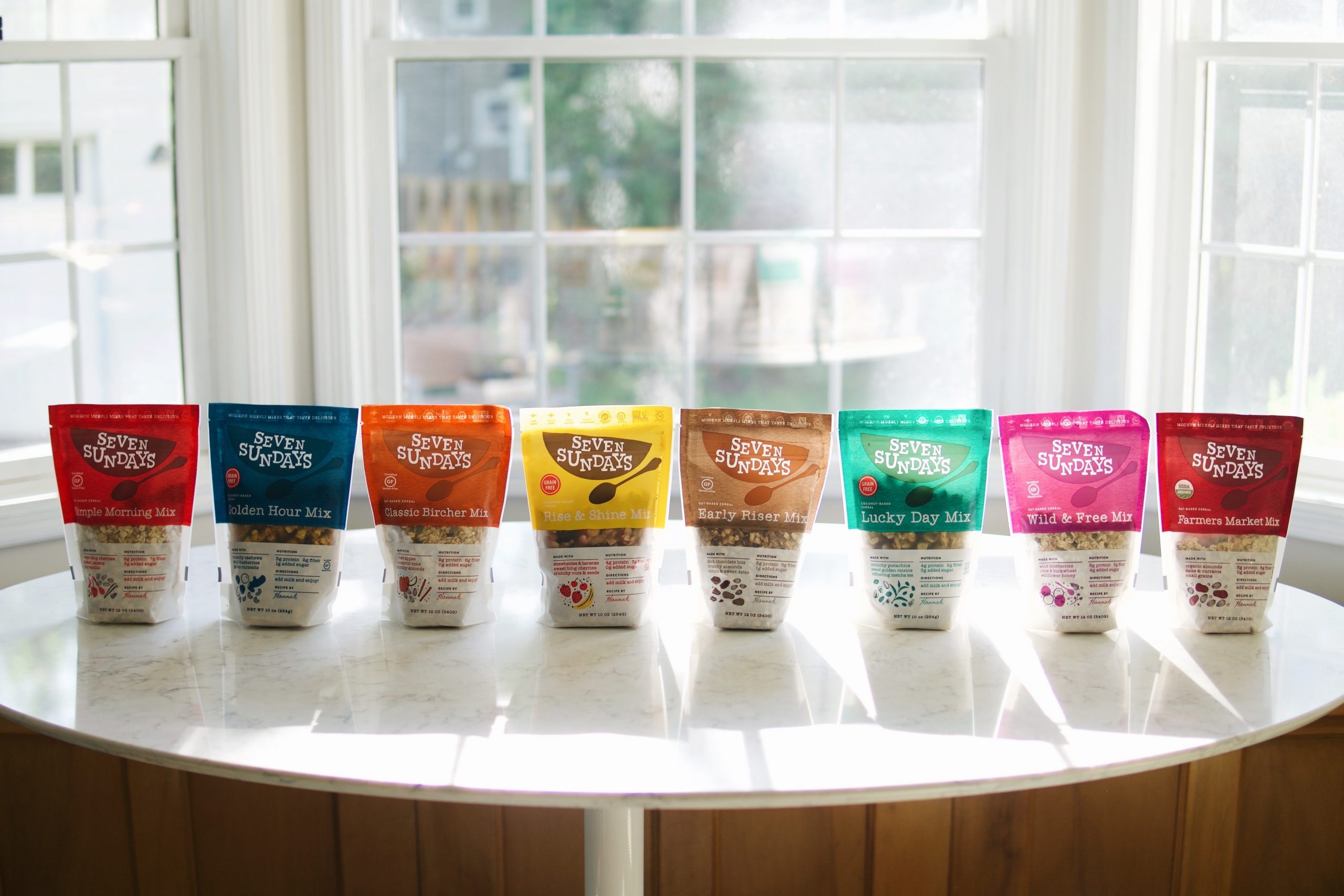By Arianne Pfoutz
When Hannah and Brady Barnstable were honeymoon-hiking their way through New Zealand, they got hooked on a nutrient-dense breakfast of muesli. Returning to New York City, their habit lingered but they couldn’t find a quality replacement…fillers and milk powders had adulterated the fresh, vital ingredients they’d come to expect.

Doug Hilgendorf shows Brady Barnstable and son Louis his field of organic buckwheat.
So Hannah started making muesli at home. After they moved back to her native Minnesota, she whipped up batches of the plant-based, non-GMO, gluten-free cereal in a friend’s diner, and by 2012 was offering it at Minneapolis farmers’ markets. One year later, Target and 50 independent Twin Cities stores were selling it. Sales began “exploding” on Amazon. Today, Seven Sundays cereals are found in 4,500 stores nationwide, from Kroger to Sprouts and Costco—and this year, in Whole Foods Market cereal aisles.
With bright flavor profiles and high-quality ingredients—freeze-dried fruits, organic and Non-GMO Project Verified grains, nuts, seeds, and no refined sugar or added oils (a little wildflower honey)—Seven Sundays products hark back to the original muesli developed in Switzerland.
But beyond this back-to-essentials breakfast food, a deeper mission calls: turning the sugar-laden, highly processed, (and with glyphosate, toxin-filled) breakfast grocery aisle “on its head.” Last November, Seven Sundays became the first Minnesota food maker to become a Certified B corporation—committed to the highest standard of social and environmental performance, balancing profit with purpose. One company initiative is supporting small family farms in the Midwest by creating a demand for regeneratively grown and organic small grains, including oats, sorghum, and buckwheat. Sourcing practices thus promote crop diversity, soil health, and transparency for consumers.
Deliberate living, and embracing transparency
The Barnstables consider Sunday the day to ditch phones, nurture themselves, and live more intentionally and authentically. Aspiring to that simple frame of mind each day of the week, they named their company Seven Sundays.
The eight products in the muesli line are made and packaged at two manufacturing facilities in St. Peter, MN and Hartford, CT. Five of the eight varieties are oat-based (gluten-free); three are grain-free, friendly to popular diets like paleo and keto.
“We now see it firsthand—the food and agriculture system in the U.S. is broken,” Hannah said. “A massive shift is needed, and we want to be part of the solution. It’s so important to be transparent.”
Muesli essentials: clean, simple, delicious ingredients
Muesli was concocted around 1900 when Swiss doctor Maximilian Bircher-Benner combined a mixture of oats, grains, dried fruits and nuts soaked in milk to rejuvenate spa patients. Today it’s eaten cold with dairy, almond milk or yogurt, soaked overnight, or eaten hot with boiled milk or water.
“The muesli category is growing 20% each year, and every year our sales have doubled,” Hannah said. “It’s an underdeveloped category in the U.S.”
In Seven Sundays’ classic Swiss-style muesli, oats comprise less than half of the recipe—the rest is filled with nuts, seeds, buckwheat groats, sorghum flakes, organic honey, freeze-dried fruits, and spices—in various combinations. Rise & Shine, the first grain-free variety, has multiple seeds and Bing cherries; Golden Hours contains cashews, organic wild blueberries, coconut and turmeric. Lucky Day features pistachios, green raisins and matcha tea.
Seven Sundays is the only product in the cereal aisle with no added sugar and with simple ingredients—meeting an unmet consumer demand.
Half of the company’s oats are from Canada. Organic sorghum and buckwheat are grown in the Midwest. Sixty-five percent of Seven Sundays’ ingredients are certified organic.
Since the Environmental Working Group found high levels of the toxic herbicide glyphosate in many oat cereals, the practice of spraying oats with glyphosate has come under scrutiny. Seven Sundays has worked only with oat suppliers that have a strict ban on glyphosate used as a desiccant since 2015. It also tests the finished product for glyphosate, sharing test results on its website.
“Many of our customers aren’t comfortable with any level of glyphosate, especially in breakfast foods the family eats every day,” Brady added.
Creating demand for regenerative and organic small grains
Being a Certified B corporation is both an opportunity and a responsibility—requiring continual movement toward standards that “literally touch every part of the business,” Brady said.
“We need to not just reduce our impact but also be part of the solution to fix a broken system,” he said. That work includes growing the local supplier network, and creating demand for regenerative small grains in the Corn Belt—while continuing to design products incorporating those ingredients.
Seven Sundays sourced 500 acres of regenerative and organic small grains in the last 12 months (300 oats, 150 buckwheat, 50 other)—representing one million pounds of muesli. Local growers within 200 miles are prioritized. “Our local farmer network went from 1 in 2018 to 3 in 2019; this year we’ve added 3 more,” Brady said. “All of them are using 3- or 4-crop rotation systems, managed grazing, and cover cropping—things essential to organic farming and soil health.”
Growing regenerative grains can increase profits, and make farms more resilient. The biggest obstacle is a lack of infrastructure for cleaning and processing: grain has become so commoditized there are few small to mid-size facilities taking small grains.
But Midwestern farmers seem open to moving beyond the two-crop system and reintroducing small grains. Organizations such as Renewing the Countryside, Land Stewardship Project, Practical Farmers of Iowa, and Artisan Grain Collaborative are actively working to bring together the people and the concept. Seven Sundays is currently involved in a pilot project with its oat supplier, Grain Millers, along with Practical Farmers of Iowa, Sustainable Food Lab, and Oatly to contract with oat growers transitioning to organic.
“We offer cost sharing and a premium price on the transitional oats,” said Brady. “Our transitional oat acreage was 100 acres in 2019, and now we’re contracting 250 acres in 2020.”
Maintaining the delicate balance
As Seven Sundays continues its expansion into national markets, its co-founders are keen on keeping the essential vision strong.
“We want to keep growing while holding things close,” Hannah explained. “You have to make sure you keep the growth sane. As a small family business, we’re always seeking creative new ways to do things.”









